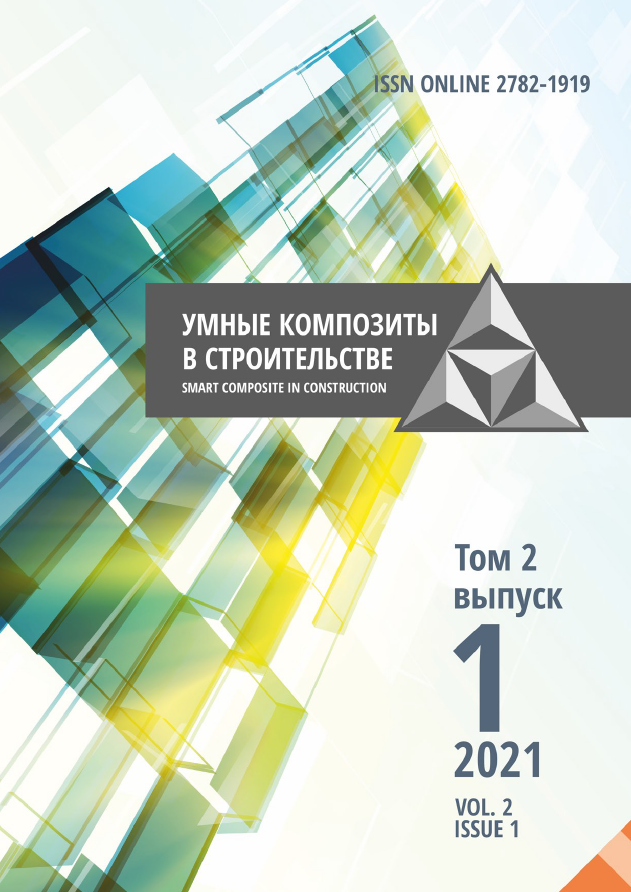Russian Federation
Russian Federation
Rostov-on-Don, Rostov-on-Don, Russian Federation
Russian Federation
Ivanovo, Ivanovo, Russian Federation
UDC 004.6
The paper argues that the problem of an increased efficiency of a construction production company is important nowadays by simulating the organizational and technological reliability of construction. An overview of Russian and international experience in solving this problem is presented. The current state of theoretical elaboration of the topic and its practical implementation are outlined in the paper. The main directions of further scientific research are also defined. The authors base their approach on the simulation of the organizational and technological reliability of construction production as a complex system, which should start with simulation of its subsystems such as construction and installation works, since the reliability of the system depends on the reliability of its components. This paper systematically reflects the modeling methods of construction and installation works in order to improve the organizational and technological reliability of construction production. The purpose of the article is the integrated presentation of methods for modeling the organizational and technological reliability of construction, which are used at the current stage of development of science of construction operations organization and the construction science as a whole. The article is particularly useful to the readers interested in the use of economic-mathematical models and methods in modern construction operations system, namely, to use models that account for different target criteria for the constructions, including multi-directional and fuzzy
construction, simulation, organizational and technological reliability, con-struction operations, construction and installation works
1. Lianying Zhang, Xiang Zhang, Teng Ma. Management of Construction Schedules Based on Building Information Modeling Technology. Emerging Technologies for Information Sys-tems, Computing, and Management. Springer, NY. 2013. V.1. P. 81-88.
2. Cormen T.H., Leiserson C.I., Rivest R.L., Stein C. Algorithms: construction and analysis. 2nd edition, Translated from English, Moscow: Williams Publishing house. 2010. 1296 p.
3. Bilec M., Ries R., Scott Matthews H. Life-Cycle Assessment Modeling of Construction Processes for Buildings. Journal of Infrastructure Systems. V. 16. N 3. 2010. P. 199-205.
4. Karhu Vesa, Keitila Matti, Lahdenpera Pertti. Construction process model. Generic present-states systematization by IDEF0. Espoo 1997. Technical Research Centre of Finland, VTT Tiedotteita – Meddelanden – Research Notes 1845. 190 p.
5. Fedosov S.V., Fedoseev V.N., Kotlov V.G., Petrukhin A.B., Oparina L.A., Martynov I.A. Theoretical bases and methods of increasing energy-efficient residential and public buildings and buildings of textile and light industry. Ivanovo: Pressto. 2018. 320 p. (in Russian).
6. Aloyan R.M., Fedosov S.V., Oparina L.A. Energy-Efficient buildings-state, problems and solutions. Ivanovo: Pressto. 2016. 240 p. (in Russian).
7. Mohamed Moussa, Janaka Y. Ruwanpura, George Jergeas, Tamer Mohamed. Hybrid Simulation Environment for Construction Projects: Identification of System Design Criteria. Journal of Construction Engineering. Vol. 2014. Article ID 847430. 12 p.
8. Zdzislaw Hejducki. Scheduling model of construction activity with time couplings. Journal of Civil Engineering and Management. 2003. 9(4). P. 284-291. DOI:https://doi.org/10.1080/13923730.2003.10531341.
9. Biruk S., Jaśkowski P., Czarnigowska A. Updating Linear Schedules with Lowest Cost: a Linear Programming Model. IOP Conf. Series: Materials Science and Engineering. 2017. 072011. 245(7) p. URL: https://www.researchgate.net/publi-cation/320860315_Updating_Linear_Schedules_with_Lowest_Cost_a_Linear_Programming_Model
10. Hojjat Adeli, Asim Karim. Construction scheduling, cost optimization, and management. Taylor & Francis e-Library. 2005. 179 p.
11. Qian Li, Sha Tao, Heap-Yih Chong, Zhijie Sasha Dong. Robust Optimization for Integrated Construction Scheduling and Multiscale Resource Allocation. Hindawi Complexity. 2018. P. 1-17.
12. Biruk S., Jaskowski J. Scheduling Linear Construction Projects with Constraints on Resource Availability. Archives of Civil Engineering. 2017. V. 63. N 1. P. 3-15.
13. Jose Maria Delos Santos. 2018 Technology and Software Trends in the Construction Industry. URL: https://project-management.com/2018-technology-and-software-trends-in-the-construction-industry
14. Mailyan A.L., Nekhay R.G. Models and algorithms of organ-izational and technological reliability in the planning and organization of construction production. Rostov-na-Donu: BARA. 2015. 116 p. (in Russian).
15. Aloyan R.M., Petrukhin A.B., Fedoseev V.N., Oparina L.A., Chistyakova Yu. A. Organizational and technical solutions for reducing the energy intensity of the Russian economy on the example of the textile and construction industries. Izv. Vyssh. Uchebn. zavedenij. Tekhnologiya Tekstil'noj Promyshlennosti. 2017. N 4 (370). P. 301-304. (in Russian).
16. Rumyantsev E.V., Fedoseev V.N., Petrukhin A.B., Oparina L.A., Chistyakova Yu.A. Socio-economic effects of reducing the energy intensity of the Russian economy. Ivanovo: Pressto. 2018. 128 p.
17. Aloyan R.M., Petrukhin A.B., Filimonova N.M., Kapustina N.V. Management of logistic risk factors in the process of production organization. Izv. Vyssh. Uchebn. zavedenij. Tekhnologiya Tekstil'noj Promyshlennosti. 2017. N 4 (370). P. 94-97. (in Russian).








